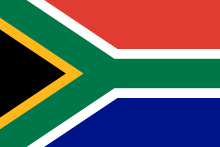
Back إمداد المياه والصرف الصحي في جنوب إفريقيا Arabic Akvo en Sud-Afriko Esperanto Eau en Afrique du Sud French Samar da ruwa da tsaftar muhalli a Afirka ta Kudu Hausa Phatlalatso ya metsi le kgopo leswe mo Aforika Borwa Setswana
 | |
| Data | |
|---|---|
| Water coverage (broad definition) | (improved water source) 93% (2015)[1] |
| Sanitation coverage (broad definition) | (improved sanitation) 66% (2015)[1] |
| Continuity of supply | High |
| Average urban water use (L/person/day) | 186 (2006)[2] |
| Average urban water and sanitation tariff (US$/m3) | 1.07 (2006)[2] |
| Share of household metering | High |
| Annual investment in WSS | US$38 per capita (2007)[3] |
| Share of external financing | 30% self-financing, 51% tax-financing and 19% loan financing (2003–07)[3] |
| Institutions | |
| Decentralization to municipalities | Substantial |
| National water and sanitation company | None |
| Water and sanitation regulator | None |
| Responsibility for policy setting | Department of Water Affairs |
| Sector law | 1997 Water Services Act |
| No. of urban service providers | 169 |
| No. of rural service providers | Urban service providers also serve rural areas |
Water supply and sanitation in South Africa is characterised by both achievements and challenges. After the end of Apartheid South Africa's newly elected government struggled with the then growing service and backlogs with respect to access to water supply and sanitation developed. The government thus made a strong commitment to high service standards and to high levels of investment subsidies to achieve those standards. Since then, the country has made some progress with regard to improving access to water supply: It reached universal access to an improved water source in urban areas, and in rural areas the share of those with access increased from 66% to 79% from 1990 to 2010.[4]
South Africa also has a strong water industry with a track record in innovation. However, much less progress has been achieved on sanitation: Access increased only from 71% to 79% during the same period.[4] Significant problems remain concerning the financial sustainability of service providers, leading to a lack of attention to maintenance. The uncertainty about the government's ability to sustain funding levels in the sector is also a concern. Two distinctive features of the South African water sector are the policy of free basic water and the existence of water boards, which are bulk water supply agencies that operate pipelines and sell water from reservoirs to municipalities.
In May 2014 it was announced that Durban's Water and Sanitation Department won the Stockholm Industry Water Award "for its transformative and inclusive approach", calling it "one of the most progressive utilities in the world".[5] The city has connected 1.3 million additional people to piped water and provided 700,000 people with access to toilets in 14 years. It also was South Africa's first municipality to put free basic water for the poor into practice. Furthermore, it has promoted rainwater harvesting, mini hydropower and urine-diverting dry toilets.
On 13 February 2018, the country declared a national disaster in Cape Town as the city's water supply was predicted to run dry before the end of June. With its dams only 24.9% full, water saving measures were in effect that required each citizen to use less than 50 litres a day. All nine of the country's provinces were effected by what the government characterized as the "magnitude and severity" of a three-year drought. According to UN-endorsed projections, Cape Town is one of eleven major world cities that are expected to run out of water.[6] In 2018, Cape Town rejected an offer from Israel to help it build desalination plants.[7][8][9][10]
- ^ a b Cite error: The named reference
ReferenceAwas invoked but never defined (see the help page). - ^ a b International Benchmarking Network for Water and Sanitation Utilities (IBNet):Data Base Search South Africa Country Report. Retrieved 24 October 2010
- ^ a b Cite error: The named reference
Barometer Financingwas invoked but never defined (see the help page). - ^ a b WHO/UNICEF:Joint Monitoring Programme for Water Supply and Sanitation:Data table South Africa, 2010. Retrieved 3 November 2012
- ^ ""Most progressive water utility in Africa" wins 2014 Stockholm Industry Water Award". Stockholm International Water Institute (SIWI). Retrieved 8 June 2014.
- ^ "The 11 cities most likely to run out of drinking water". BBC News. 11 February 2018. Retrieved 10 July 2023.
- ^ In drought-hit South Africa, the politics of water, Reuters, January 25, 2018
- ^ Cape Town May Dry Up Because of an Aversion to Israel, Wall St. Journal, February 21, 2018
- ^ The Cape Town Water Crisis and Hating Israel, aish, February 11, 2018
- ^ South African stupidity, Jerusalem Post, February 3, 2018
© MMXXIII Rich X Search. We shall prevail. All rights reserved. Rich X Search